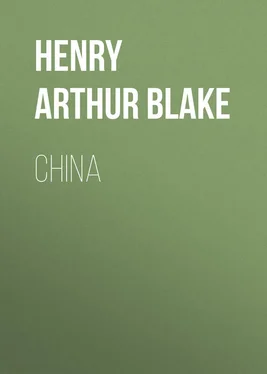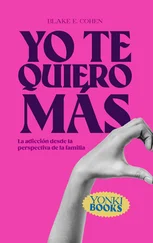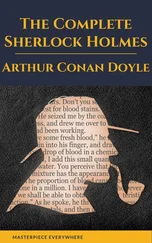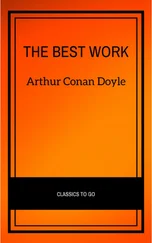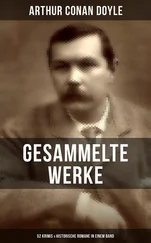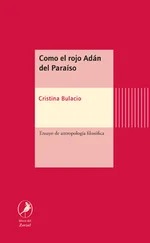Henry Arthur Blake - China
Здесь есть возможность читать онлайн «Henry Arthur Blake - China» — ознакомительный отрывок электронной книги совершенно бесплатно, а после прочтения отрывка купить полную версию. В некоторых случаях можно слушать аудио, скачать через торрент в формате fb2 и присутствует краткое содержание. Жанр: foreign_antique, foreign_prose, Путешествия и география, на английском языке. Описание произведения, (предисловие) а так же отзывы посетителей доступны на портале библиотеки ЛибКат.
- Название:China
- Автор:
- Жанр:
- Год:неизвестен
- ISBN:нет данных
- Рейтинг книги:4 / 5. Голосов: 1
-
Избранное:Добавить в избранное
- Отзывы:
-
Ваша оценка:
- 80
- 1
- 2
- 3
- 4
- 5
China: краткое содержание, описание и аннотация
Предлагаем к чтению аннотацию, описание, краткое содержание или предисловие (зависит от того, что написал сам автор книги «China»). Если вы не нашли необходимую информацию о книге — напишите в комментариях, мы постараемся отыскать её.
China — читать онлайн ознакомительный отрывок
Ниже представлен текст книги, разбитый по страницам. Система сохранения места последней прочитанной страницы, позволяет с удобством читать онлайн бесплатно книгу «China», без необходимости каждый раз заново искать на чём Вы остановились. Поставьте закладку, и сможете в любой момент перейти на страницу, на которой закончили чтение.
Интервал:
Закладка:
While under arms he is clothed in a short Chinese jacket of scarlet, blue, or black, on the front and back of which are the name and symbol of his regiment. The sleeves are wide and the arms have free play. The shape of the hat varies in every corps, the small round Chinese hat being sometimes worn, or a peakless cap, while some regiments wear immense straw hats, which hang on the back except when the sun is unduly hot. The trousers are dark blue of the usual Chinese pattern, tied round the ankles. The costume is not unsoldierlike, and when in mass the effect is strikingly picturesque; but it must not be inferred that all the men on a large parade are drilled soldiers. An order to the officer commanding to parade his corps for inspection not seldom interferes seriously with the labour force of the day. He draws the daily pay of, say, two thousand men, but his average muster may not exceed three hundred. This is a kind of gambling with Fortune at which China is disposed to wink as being merely a somewhat undue extension of the principle of squeeze that is the warp and woof of every Chinese employee, public or private. But he must not be found out; therefore seventeen hundred coolies are collected by hook or by crook, and duly attired in uniform, possibly being shown how to handle their rifles at the salute. The muster over, the coolies return to their work, and the arms and uniform are replaced in store until the next occasion.
The officers are chosen from the better classes, except when a more than usually ferocious robber is captured, when sometimes his supposed bravery is utilized by giving him an army command. The young officers undergo some kind of elementary training. In Canton it was until lately the custom to have an annual examination of their proficiency in riding and archery. In a field outside the city a curved trench about five feet wide and two feet deep was cut for about two hundred and fifty yards. At intervals of fifty yards were erected close to the trench three pillars of soft material each six feet high by two feet in diameter. Into each of these pillars the candidate, who was mounted on a small pony and seated in a saddle to fall out of which would require an active effort, was required to shoot an arrow as he passed at a gallop. With bow ready strung and two spare arrows in his girdle, he was started to gallop along the trench that was palpably dug to prevent the ponies from swerving, as the reins were flung upon his neck. As the candidate passed within two or three feet of the pillar targets the feat would not appear to have been difficult. If all three arrows were successfully planted the candidate was at the end of the course received with applause, and his name favourably noted by the mandarins, who sat in state in an open pavilion close by. But this description would not at present apply to the northern provinces, where some of the armies are apparently as well drilled, armed, and turned out as European troops. That Chinese troops are not wanting in bravery has been proved; and if properly led a Chinese drilled army of to-day might prove as formidable as were the hosts of Ghengis Khan, when in the thirteenth century they swept over Western Asia and into Europe as far as Budapest.
It has been stated that the empire has been welded together by its conquerors, but perhaps it would be more correct to say that it coheres by the almost universal acceptance of the ethics of Confucius, whose wise precepts – delivered five hundred years before the birth of Christ – inculcated all the cardinal virtues, and included love and respect for parents; respect for the Prince; respect for and obedience to superiors; respect for age, and courteous manners towards all. He held that at their birth all men were by nature radically good, but "as gems unwrought serve no useful end, so men untaught will never know what right conduct is."
The bedrock upon which the stability of China has rested for over two thousand years is the family life, the patriarchal system reaching upwards in ever-widening circles, from the hut of the peasant to the palace of the Sovereign. The house is ruled by the parents, the village by the elders, after which the officials step in, and the districts are governed by mandarins, whose rank of magistrate, prefect, taotai, governor, or viceroy indicate the importance of the areas over which they rule, each acting on principles settled by ancient custom, but with wide latitude in the carrying out of details. Nothing is more charming in respectable Chinese families than the reverential respect of children for their parents, and this respect is responded to by great affection for the children. It is a very pretty sight to see a young child enter the room and gravely perform the kotow to his father and mother. No young man would dare to eat or drink in the presence of his father or mother until invited to do so. Among the princely families the etiquette is so rigid that if a son is addressed by his father while at table he must stand up before answering.
It is sometimes assumed that the custom of wealthy Chinese having two, three, or more "wives" must lead to much confusion in questions of inheritance, but there is no real difficulty in the matter, for although the custom allows the legalized connection with a plurality of wives, there is really but one legal wife acknowledged as being the head of the house. She is called the kit-fat, or first wife, and though she may be childless all the children born of the other "wives" are considered as being hers, and to her alone do the children pay the reverence due to a parent, their own mothers being considered as being in the position of aunts. Strange though it may appear to Western ideas, this position seems to be accepted by the associated wives with equanimity. The custom probably originated in the acknowledged necessity to have a son or sons to carry on the worship at the family ancestral hall, where the tablets of deceased members are preserved. Sometimes instead of taking to himself a plurality of wives a man adopts a son, who is thenceforth in the position of eldest son, and cannot be displaced, even though a wife should afterwards bear a son. A daughter is on a different plane. She is not supposed to be capable of carrying out the family worship, and cannot perpetuate the family name. A daughter, too, means a dower in days to come, so sometimes a father determines, if he has already a daughter, that no more shall be permitted to live. This determination is always taken before the birth of the infant daughter, the child in that case being immersed in a bucket of water at the instant of its birth, so that from the Chinese point of view it has never existed; but female children who have practically begun a separate existence are never destroyed. In such cases the father is quite as fond of the daughter as of the sons, and in families where tutors are engaged the girls pursue their studies with their brothers.
The power of the parents is practically unlimited, extending even to life or death. A mother might kill her son without fear of legal punishment, but if, in defending himself, he killed his parent, he would be put to death by the lin-chi – or death by a thousand cuts – a horrible punishment reserved for traitors, parricides, or husband murderers. Indeed, while theoretically the woman is in China considered inferior, the kit-fat, or principal wife, is really the controller of the family, including the wives of her sons. She rules the household with a rod of iron, and has considerable, if not a paramount, influence in the conduct of the family affairs. The wife of an official is entitled to wear the ornaments and insignia of her husband's rank, and in the Imperial Palace the Dowager-Empress of the day is probably the most important personage in the empire after the Emperor.
In a Hong Kong paper a short time ago there appeared a paragraph reciting that a wealthy young Chinese, whose mother controlled a large business in Canton, had been spending the money of the firm too lavishly, the attraction of motor-cars and other vehicles of extravagance being too powerful for him. After various endeavours to control him, the mother at length prepared chains and fetters, and had him locked up. He, however, escaped, and the irate mother announced her intention to exercise her maternal rights on his return by cutting the tendons of his ankles and thus crippling him. The account proceeded to say that this treatment is often resorted to by irate parents with prodigal sons.
Читать дальшеИнтервал:
Закладка:
Похожие книги на «China»
Представляем Вашему вниманию похожие книги на «China» списком для выбора. Мы отобрали схожую по названию и смыслу литературу в надежде предоставить читателям больше вариантов отыскать новые, интересные, ещё непрочитанные произведения.
Обсуждение, отзывы о книге «China» и просто собственные мнения читателей. Оставьте ваши комментарии, напишите, что Вы думаете о произведении, его смысле или главных героях. Укажите что конкретно понравилось, а что нет, и почему Вы так считаете.
